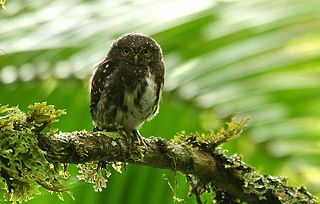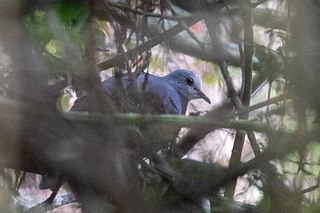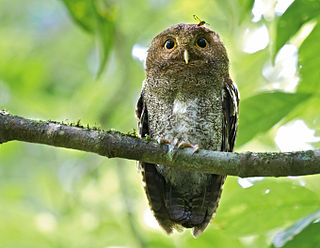
The russet-throated puffbird is a species of near-passerine bird in the family Bucconidae, the puffbirds, nunlets, and nunbirds. It is found in Colombia and Venezuela.

The unspotted saw-whet owl is a small "typical owl" in subfamily Surniinae. It is found in Costa Rica, El Salvador, Guatemala, Mexico, and Panama.

The grey-headed dove (Leptotila plumbeiceps) is a large New World dove. It is found from eastern Mexico to Colombia.

The russet antshrike is a passerine bird in subfamily Myrmornithinae of family Thamnophilidae, the "typical antbirds". It is found in Mexico, every Central American country except El Salvador, Colombia, Ecuador, Venezuela, and possibly Peru.

The chestnut-backed antbird is a passerine bird in subfamily Thamnophilinae of family Thamnophilidae, the "typical antbirds". It is found in Colombia, Costa Rica, Ecuador, Honduras, Nicaragua, and Panama.

The wrenthrush or zeledonia is a unique species of nine-primaried oscine bird which is endemic to Costa Rica and Panama.

The Costa Rican pygmy owl is a small "typical owl" in subfamily Surniinae. It is found in Costa Rica and Panama.

The Central American pygmy owl is a species of owl in the family Strigidae. It is found in Belize, Colombia, Costa Rica, Ecuador, Guatemala, Honduras, Mexico, Nicaragua, and Panama.

The maroon-chested ground dove is a species of bird in the family Columbidae. It is found in Bolivia, Colombia, Costa Rica, Ecuador, El Salvador, Guatemala, Honduras, Mexico, Panama, Peru, and Venezuela.

The timberline wren is a species of bird in the family Troglodytidae. It is found in Costa Rica and western Panama.

The spot-breasted wren is a species of bird in the family Troglodytidae. It is found in Belize, Costa Rica, El Salvador, Guatemala, Honduras, Mexico, and Nicaragua.

Cabanis's wren is a species of bird in the family Troglodytidae. It is found in Belize, Costa Rica, El Salvador, Guatemala, Honduras, Mexico, and Nicaragua.

The bay wren is a species of bird in the family Troglodytidae. It is native to southern Central America and northwestern South America.

The sooty-headed wren is a species of bird in the family Troglodytidae. It is found in Colombia and Panama.

The stripe-breasted wren is a species of bird in the family Troglodytidae. It is found in Honduras, Nicaragua, Costa Rica, and Panama.

The gartered trogon, also known as the northern violaceous trogon, is a bird in the family Trogonidae, the quetzals and trogons. It is found in Mexico, all of Central America, and Colombia, Ecuador, Peru, and Venezuela.

The vermiculated screech owl, is a subspecies of Middle American screech owl, or possibly separate species of owl in the family Strigidae. It is found in Costa Rica, Nicaragua, and Panama.

The canebrake wren is a species of bird in the family Troglodytidae. It is found in Costa Rica, Nicaragua, and Panama.

The russet-naped wood rail or rufous-naped wood rail is a species of bird in the subfamily Rallinae of the rail, crake, and coot family Rallidae. It is found from Mexico to Costa Rica.

The Talamanca hummingbird or admirable hummingbird is a species of hummingbird in the "mountain gems", tribe Lampornithini in subfamily Trochilinae. It is found in Costa Rica and Panama.





















